Aerobic Training on Mental Health in Children and Adolescents: A Systematic Review with Meta-Analysis
Abstract
1. Introduction
2. Materials and Methods
2.1. Sources of Information and Search Strategy
2.2. Selection Criteria
2.3. Data Extraction and Reliability
2.4. Assessment of Methodological Quality
2.5. Analytical Decisions for Meta-Analysis
3. Results
3.1. Study Selection Process
3.2. Methodological Quality
3.3. Characteristics of the Studies
3.4. Study Results
3.5. Meta-Analysis
3.5.1. Subgroup Analysis
Depression
Anxiety
Mood and Emotional State
Self-Esteem
Stress
3.5.2. Sensitivity Analyses
3.5.3. Meta-Regression
4. Discussion
5. Conclusions
Supplementary Materials
Author Contributions
Funding
Institutional Review Board Statement
Informed Consent Statement
Data Availability Statement
Conflicts of Interest
Abbreviations
| PA | physical activity |
| BDNF | Brain-derived neurotrophic factor |
| RCTs | Randomized controlled trials |
| PHQA | Patient Health Questionnaire–A |
| SCARED | The Screen for Child Anxiety and Related Emotional Disorders |
| SDQ | The Self-Description Questionnaire |
| SSRS | Social Skills Rating System |
| CY-PSPP | Children and Youth Physical Self-Perception Profile |
| PSDQ | Physical Self-Description Questionnaire |
| SAS–A | the Social Anxiety Scale for Adolescents |
| SPPA | Self-Perception Profile for Adolescents |
| BASC-2 | Behavior Assessment System for Children–Second Edition |
| RS | Resilience Scale |
| PSS | The Perceived Stress Scale |
| BYI-II | The Beck Depression Inventory and The Beck anxiety Inventory |
| STAIC | The State–Trait Anxiety Inventory for Children |
| SDQ-I | Self-Description Questionnaire I |
| POMS-SF | Profile of Mood States–Short Form |
| CDI-2 | Children’s Depression Inventory-2 |
| ASS | the Academic Stress Scale |
| CDI | The Children’s Depression Inventory |
| ISEQ | the Indian adaptation of Battle’s self-esteem questionnaire |
| SPPC | Self-Perception Profile for Children |
| SF-12v2 | Short Form-12 Health Survey version 2 |
| RSES | Rosenberg Self-Esteem Scale |
| SEAS | Student Examination Anxiety Scale |
| ADSS | Anxiety, Depression and Stress Scale |
References
- UNICEF. The State of the World’s Children 2021: On My Mind—Promoting, Protecting and Caring for Children’s Mental Health; UNICEF: New York, NY, USA, 2021; Available online: https://data.unicef.org/topic/child-health/mental-health (accessed on 13 July 2025).
- World Health Organization (WHO). Adolescent Mental Health; WHO: Geneva, Switzerland, 2021; Available online: https://www.who.int/news-room/fact-sheets/detail/adolescent-mental-health (accessed on 13 July 2025).
- Paulus, F.W.; Ohmann, S.; Möhler, E.; Plener, P.; Popow, C. Emotional Dysregulation in Children and Adolescents With Psychiatric Disorders: A Narrative Review. Front. Psychiatry 2021, 12, 628252. [Google Scholar] [CrossRef]
- UNICEF España. La Salud Mental de los Adolescentes en España: Situación Actual y Retos Futuros; UNICEF España: Madrid, Spain, 2023; Available online: https://www.unicef.es/educa/salud-mental-infanto-juvenil (accessed on 13 July 2025).
- Soriano, V.; Ramos, J.M.; López-Ibor, M.I.; Chiclana-Actis, C.; Faraco, M.; González-Cabrera, J.; González-Fraile, E.; González-Fraile, G.; Pinargote, H.; Corpas, M.; et al. Hospital admissions in adolescents with mental disorders in Spain over the last two decades: A mental health crisis? Eur. Child Adolesc. Psychiatry 2023, 34, 1125–1134. [Google Scholar]
- Alhusseini, N.; Lin, T.K.; Werner, K.; Lin, G.; Altwaijri, Y.; Baattaiah, B.A.; Bruckner, T.; AlAhmed, R.; Alkabbani, A.; Alsukait, R.F.; et al. Cost-effectiveness of physical activity-oriented interventions for improving mental health: A systematic review. BMC Public Health 2025, 25, 1766. [Google Scholar] [CrossRef] [PubMed]
- Caspersen, C.J.; Powell, K.E.; Christenson, G.M. Physical activity, exercise, and physical fitness: Definitions and distinctions for health-related research. Public Health Rep. 1985, 100, 126–131. [Google Scholar] [PubMed]
- Bailey, R.; Vasícková, J.; Vlček, P.; Demidoff, A.R.; Pühse, U.; Heck, S.; Scheuer, C. An International Review of the Contributions of School-Based Physical Activity, Physical Education, and School Sport to the Promotion of Health-Enhancing Physical Activity; Health and Physically Active Schools in Europe: Bratislava, Slovakia, 2022. [Google Scholar]
- Janssen, I.; LeBlanc, A.G. Systematic review of the health benefits of physical activity and fitness in school-aged children and youth. Int. J. Behav. Nutr. Phys. Act. 2010, 7, 40. [Google Scholar] [CrossRef] [PubMed]
- Biddle, S.J.H.; Ciaccioni, S.; Thomas, G.; Vergeer, I. Physical activity and mental health in children and adolescents: An updated review of reviews and an analysis of causality. Psychol. Sport Exerc. 2019, 42, 146–155. [Google Scholar] [CrossRef]
- Lubans, D.R.; Richards, J.; Hillman, C.H.; Faulkner, G.; Beauchamp, M.R.; Nilsson, M.; Kelly, P.; Smith, J.J.; Raine, L.B.; Biddle, S.J.H. Physical activity for cognitive and mental health in youth: A systematic review of mechanisms. Pediatrics 2016, 138, e20161642. [Google Scholar] [CrossRef] [PubMed]
- Rodríguez, L.M.; González-Cutre, D.; Cervelló, E.; Sicilia, Á. Effects of school-based physical activity programs on psychological well-being: A meta-analysis. BMC Public Health 2024, 24, 526. [Google Scholar] [CrossRef]
- Cadenas-Sánchez, C.; Mora-González, J.; Migueles, J.H.; Esteban-Cornejo, I.; Ortega, F.B. El efecto de la actividad física sobre la salud mental de los adolescentes: Una revisión sistemática y metaanálisis. Psicol. Educ. 2023, 29, 45–55. [Google Scholar]
- Neil-Sztramko, S.E.; Caldwell, H.; Dobbins, M. School-based physical activity programs for promoting physical activity and fitness in children and adolescents aged 6 to 18. Cochrane Database Syst. Rev. 2021, 9, CD007651. [Google Scholar] [CrossRef]
- Carney, R.; Firth, J. Exercise interventions in child and adolescent mental health care: An overview of the evidence and recommendations for implementation. JCPP Adv. 2021, 1, e12031. [Google Scholar] [CrossRef]
- Dishman, R.K.; Heath, G.W.; Lee, I.M. Physical Activity Epidemiology, 3rd ed.; Human Kinetics: Champaign, IL, USA, 2021. [Google Scholar]
- Heyman, E.; Gamelin, F.X.; Goekint, M.; Piscitelli , F.; Roelands , B.; Leclair, E.; Di Marzo, V.; Meeusen , R. Intense exercise increases circulating endocannabinoid and BDNF levels in humans--possible implications for reward and depression. Psychoneuroendocrinology 2012, 37, 844–851. [Google Scholar] [CrossRef]
- Stillman, C.M.; Cohen, J.; Lehman, M.E.; Erickson, K.I. Mediators of physical activity on neurocognitive function: A review at multiple levels of analysis. Prog. Neurobiol. 2020, 193, 101938. [Google Scholar] [CrossRef]
- Kandola, A.; Ashdown-Franks, G.; Hendrikse, J.; Sabiston, C.M.; Stubbs, B. Physical activity and depression: Towards understanding the antidepressant mechanisms of physical activity. Neurosci. Biobehav. Rev. 2019, 107, 525–539. [Google Scholar] [CrossRef] [PubMed]
- Huang, W.; Wong, T.L. Exercise Prescriptions for Young People’s Emotional Wellbeing: A Systematic Review of Physical Activity Intensity, Duration, and Modality. Front. Psychol. 2025, 16, 1552531. [Google Scholar] [CrossRef] [PubMed]
- Page, M.J.; McKenzie, J.E.; Bossuyt, P.M.; Boutron, I.; Hoffmann, T.C.; Mulrow, C.D.; Shamseer, L.; Tetzlaff, J.M.; Akl, E.A.; Brennan, S.E.; et al. The PRISMA 2020 statement: An updated guideline for reporting systematic reviews. BMJ 2021, 372, n71. [Google Scholar] [CrossRef]
- Higgins, J.P.T.; Thomas, J.; Chandler, J.; Cumpston, M.; Li, T.; Page, M.J.; Welch, V.A. Cochrane Handbook for Systematic Reviews of Interventions; Version 6.4; Cochrane: London, UK, 2023; Available online: https://www.cochrane.org/authors/handbooks-and-manuals/handbook (accessed on 13 July 2025).
- Cashin, A.G.; McAuley, J.H. Clinimetrics: Physiotherapy Evidence Database (PEDro) Scale. J. Physiother. 2020, 66, 59. [Google Scholar] [CrossRef] [PubMed]
- Carter, T.; Morres, I.; Meade, O.; Callaghan, P. The Effect of Exercise on Depressive Symptoms in Adolescents: A Systematic Review and Meta-Analysis. J. Am. Acad. Child Adolesc. Psychiatry 2016, 55, 580–590. [Google Scholar] [CrossRef]
- Rodríguez-Ayllón, M.; Cadenas-Sánchez, C.; Estévez-López, F.; Muñoz, N.E.; Mora-González, J.; Migueles, J.H.; Molina-García, P.; Henriksson, H.; Mena-Molina, A.; Martínez-Vizcaíno, V.; et al. Role of Physical Activity and Sedentary Behavior in the Mental Health of Preschoolers, Children and Adolescents: A Systematic Review and Meta-Analysis. Sports Med. 2019, 49, 1383–1410. [Google Scholar] [CrossRef] [PubMed]
- Annesi, J.J. Improvements in self-concept associated with reductions in negative mood in preadolescents enrolled in an after-school physical activity program. Psychol. Rep. 2005, 97, 400–404. [Google Scholar] [CrossRef]
- Bazzano, A.N.; Sun, Y.; Chavez-Gray, V.; Akintimehin, T.; Gustat, J.; Barrera, D.; Roi, C. Effect of yoga and mindfulness intervention on symptoms of anxiety and depression in young adolescents attending middle school: A pragmatic community-based cluster randomized controlled trial in a racially diverse urban setting. Int. J. Environ. Res. Public Health 2022, 19, 12076. [Google Scholar] [CrossRef] [PubMed]
- Bohnert, A.M.; Ward, A.K. Making a difference: Evaluating the Girls in the Game (GIG) after-school program. J. Early Adolesc. 2013, 33, 104–130. [Google Scholar] [CrossRef]
- Burgess, G.; Grogan, S.; Burwitz, L. Effects of a 6-week aerobic dance intervention on body image and physical self-perceptions in adolescent girls. Body Image 2006, 3, 57–66. [Google Scholar] [CrossRef]
- Cowley, E.S.; Watson, P.M.; Foweather, L.; Belton, S.; Mansfield, C.; Whitcomb-Khan, G.; Cacciatore, I.; Thompson, A.; Thijssen, D.; Wagenmakers, A.J. Formative evaluation of a home-based physical activity intervention for adolescent girls—The HERizon Project: A randomised controlled trial. Children 2021, 8, 76. [Google Scholar] [CrossRef] [PubMed]
- Crews, D.J.; Lochbaum, M.R.; Landers, D.M. Aerobic physical activity effects on psychological well-being in low-income Hispanic children. Percept. Mot. Ski. 2004, 98, 319–324. [Google Scholar] [CrossRef]
- Eather, N.; Morgan, P.J.; Lubans, D.R. Effects of exercise on mental health outcomes in adolescents: Findings from the CrossFit™ Teens randomized controlled trial. Psychol. Sport Exerc. 2016, 26, 14–23. [Google Scholar] [CrossRef]
- Gaurav, P.; Bera, T.K.; Uddhav, S. Yoga for controlling examination anxiety, depression and academic stress among students appearing for Indian board examination. Int. J. Recent Sci. Res. 2013, 4, 1216–1219. [Google Scholar]
- Jelalian, E.; Sato, A.; Hart, C.N. The effect of group-based weight-control intervention on adolescent psychosocial outcomes: Perceived peer rejection, social anxiety, and self-concept. Child. Health Care 2011, 40, 197–211. [Google Scholar] [CrossRef] [PubMed]
- Khalsa, S.B.; Hickey-Schultz, L.; Cohen, D.; Steiner, N.; Cope, S. Evaluation of the mental health benefits of yoga in a secondary school: A preliminary randomized controlled trial. J. Behav. Health Serv. Res. 2012, 39, 80–90. [Google Scholar] [CrossRef] [PubMed]
- Lobo, Y.B.; Winsler, A. The effects of a creative dance and movement program on the social competence of Head Start preschoolers. Soc. Dev. 2006, 15, 501–519. [Google Scholar] [CrossRef]
- Melnyk, B.M.; Jacobson, D.; Kelly, S.; O’HAver, J.; Small, L.; Mays, M.Z. Improving the mental health, healthy lifestyle choices, and physical health of Hispanic adolescents: A randomized controlled pilot study. J. Sch. Health 2009, 79, 575–584. [Google Scholar] [CrossRef]
- Melnyk, B.M.; Jacobson, D.; Kelly, S.; Belyea, M.; Shaibi, G.; Small, L.; O’hAver, J.; Marsiglia, F.F. Promoting healthy lifestyles in high school adolescents: A randomized controlled trial. Am. J. Prev. Med. 2013, 45, 407–415. [Google Scholar] [CrossRef]
- Noggle, J.J.; Steiner, N.J.; Minami, T.; Khalsa, S.B.S. Benefits of yoga for psychosocial well-being in a US high school curriculum: A preliminary randomized controlled trial. J. Dev. Behav. Pediatr. 2012, 33, 193–201. [Google Scholar] [CrossRef]
- Olive, L.S.; Byrne, D.; Cunningham, R.B.; Telford, R.M.; Telford, R.D. Can physical education improve the mental health of children? The LOOK study cluster-randomized controlled trial. J. Educ. Psychol. 2019, 111, 1331. [Google Scholar] [CrossRef]
- Sharma, V.; Shrivastava, S.; MalhSharma, U.K.; Shrivastava, S.; Malhotra, S.; Singh, R.; Singh, T.B. Yoga and cognitive behavior techniques for academic stress and mental wellbeing among school students. Delhi Psychiatry J. 2010, 13, 12–19. [Google Scholar]
- Smith, J.J.; Beauchamp, M.R.; Faulkner, G.; Morgan, P.J.; Kennedy, S.G.; Lubans, D.R. Intervention effects and mediators of well-being in a school-based physical activity program for adolescents: The ‘Resistance Training for Teens’ cluster RCT. Ment. Health Phys. Act. 2018, 15, 88–94. [Google Scholar] [CrossRef]
- Telles, S.; Singh, N.; Bhardwaj, A.; Kumar, A.; Balkrishna, A. Effect of yoga or physical exercise on physical, cognitive and emotional measures in children: A randomized controlled trial. Child Adolesc. Psychiatry Ment. Health 2013, 7, 37. [Google Scholar] [CrossRef] [PubMed]
- Wassenaar, T.M.; Wheatley, C.M.; Beale, N.; Nichols, T.; Salvan, P.; Meaney, A.; Atherton, K.; Diaz-Ordaz, K.; Dawes, H.; Johansen-Berg, H. The effect of a one-year vigorous physical activity intervention on fitness, cognitive performance and mental health in young adolescents: The Fit to Study cluster randomised controlled trial. Int. J. Behav. Nutr. Phys. Act. 2021, 18, 47. [Google Scholar] [CrossRef] [PubMed]
- Ho, F.K.; Louie, L.H.T.; Wong, W.H.S.; Chan, K.L.; Tiwari, A.; Chow, C.B.; Ip, P. Effect of a mind–body exercise on children with autism spectrum disorders: A randomized controlled trial. Pediatr. Res. 2017, 81, 581–589. [Google Scholar] [CrossRef]
- Wang, Y.; Chan, C.H.Y.; Li, W.H.C.; Lau, Y.; Ho, K.Y.; Lee, I.K.M.; Chung, J.O.K. Effects of a school-based physical activity intervention on mental health in Chinese adolescents: A randomized controlled trial. Int. J. Environ. Res. Public Health 2025, 22, 263. [Google Scholar] [CrossRef]
- Almeida, I.L.L.; Rego, J.F.; Teixeira, A.C.G.; Moreira, M.R. Social isolation and its impact on child and adolescent development: A systematic review. Rev. Paul. Pediatr. 2021, 40, e2020385. [Google Scholar] [CrossRef] [PubMed]
- Korczak, D.J.; Madigan, S.; Colasanto, M. Children’s Physical Activity and Depression: A Meta-analysis. Pediatrics 2017, 139, e20162266. [Google Scholar] [CrossRef] [PubMed]
- Kvam, S.H.; Kleppe, C.L.; Nordhus, I.H.; Hovland, A. Exercise as a treatment for depression: A meta-analysis. J. Affect. Disord. 2016, 202, 67–86. [Google Scholar] [CrossRef]
- Vaquero-Solís, M.; Gallego, D.I.; Tapia-Serrano, M.Á.; Pulido, J.J.; Sánchez-Miguel, P.A. School-Based Physical Activity Interventions in Children and Adolescents: A Systematic Review. Int. J. Environ. Res. Public Health 2020, 17, 999. [Google Scholar] [CrossRef]
- Beesdo, K.; Knappe, S.; Pine, D.S. Anxiety and anxiety disorders in children and adolescents: Developmental issues and implications for DSM-V. Psychiatr. Clin. N. Am. 2009, 32, 483–524. [Google Scholar] [CrossRef]
- Caouette, J.D.; Guyer, A.E. Gaining insight into adolescent vulnerability for social anxiety from developmental cognitive neuroscience. Dev. Cogn. Neurosci. 2014, 8, 65–76. [Google Scholar] [CrossRef]
- Pascoe, M.C.; Bailey, A.P.; Craike, M.; Carter, T.; Patten, R.; Stepto, N.K.; Parker, A.G. Physical activity and exercise in youth mental health promotion: A scoping review. BMJ Open Sport Exerc. Med. 2020, 6, e000677. [Google Scholar] [CrossRef]
- Hoare, E.; Milton, K.; Foster, C.; Allender, S. The associations between sedentary behaviour and mental health among adolescents: A systematic review. Int. J. Behav. Nutr. Phys. Act. 2016, 13, 108. [Google Scholar] [CrossRef]
- Hegberg, N.J.; Tone, E.B. Physical activity and stress resilience: Considering those at risk for developing mental health problems. Ment. Health Phys. Act. 2015, 8, 1–7. [Google Scholar] [CrossRef]
- Nemoto, M.; Nemoto, K.; Sasai, H.; Ota, M.; Haneda, M.; Sekine, A.; Arai, T. Emotional Response to Various Exercise Types in Patients With Mental Disorders. Cureus 2024, 16, e75371. [Google Scholar] [CrossRef] [PubMed]
- Henriksen, I.O.; Ranøyen, I.; Indredavik, M.S.; Stenseng, F. The role of self-esteem in the development of psychiatric problems: A three-year prospective study in a clinical sample of adolescents. Child Adolesc. Psychiatry Ment. Health 2017, 11, 68. [Google Scholar] [CrossRef] [PubMed]
- Ekeland, E.; Heian, F.; Hagen, K.B.; Abbott, J.; Nordheim, L. Exercise to improve self-esteem in children and young people. Cochrane Database Syst. Rev. 2019, 1, CD003683. [Google Scholar] [CrossRef]
- Gentile, A.; Boca, S.; Giammusso, I.; Rosa, S.; Agostini, T. Self-concept and perceived physical competence in adolescents: Mediating role in the relationship between physical activity and psychological well-being. Int. J. Environ. Res. Public Health 2022, 19, 2395. [Google Scholar] [CrossRef]
- Fernández-Bustos, J.G.; González-Martí, I.; Contreras, O.R.; Cuevas, R. Physical self-concept and physical activity levels in adolescents: A systematic review. Children 2021, 8, 672. [Google Scholar] [CrossRef]
- Saavedra, J.M.; Domínguez, A.M.; García-Hermoso, A.; Escalante, Y. Effects of creative dance on self-concept in adolescents: A meta-analysis. Int. J. Environ. Res. Public Health 2020, 17, 4755. [Google Scholar] [CrossRef]
- Sisto, A.; Vicinanza, F.; Campanozzi, L.L.; Ricci, G.; Tartaglini, D.; Tambone, V. Towards a Transversal Definition of Psychological Resilience: A Literature Review. Medicina 2019, 55, 745. [Google Scholar] [CrossRef]
- McMahon, E.M.; Corcoran, P.; O’Regan, G.; Keeley, H.; Cannon, M.; Carli, V.; Wasserman, C.; Hadlaczky, G.; Sarchiapone, M.; Apter, A.; et al. Physical activity in European adolescents and associations with anxiety, depression and well-being. Eur. Child Adolesc. Psychiatry 2017, 26, 111–122. [Google Scholar] [CrossRef]
- Kenttä, G.; Grape, F.; Holmström, T.; Hassmén, N. Physical activity as a pathway to resilience: A scoping review. Int. J. Environ. Res. Public Health 2020, 17, 8584. [Google Scholar] [CrossRef]


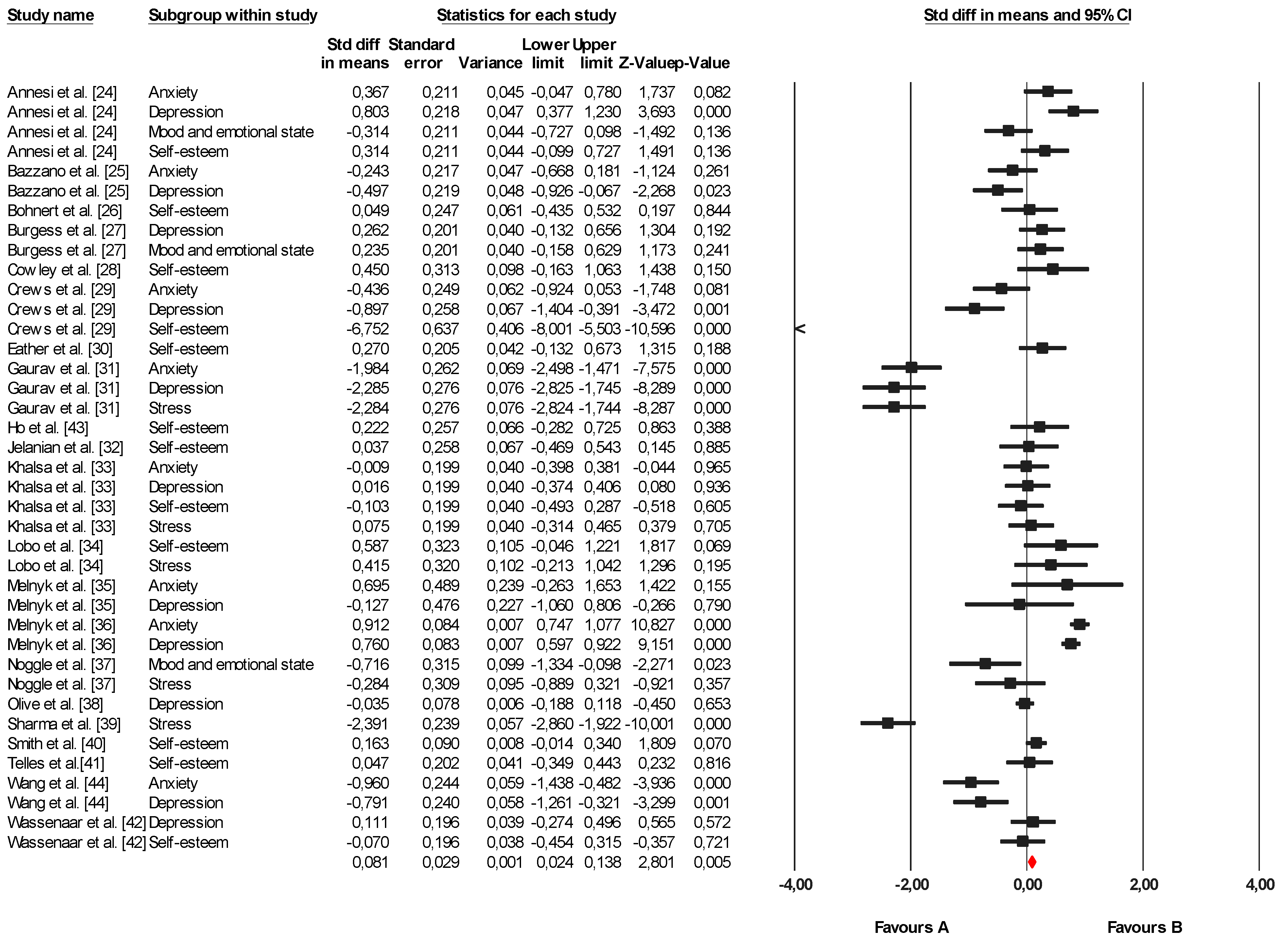
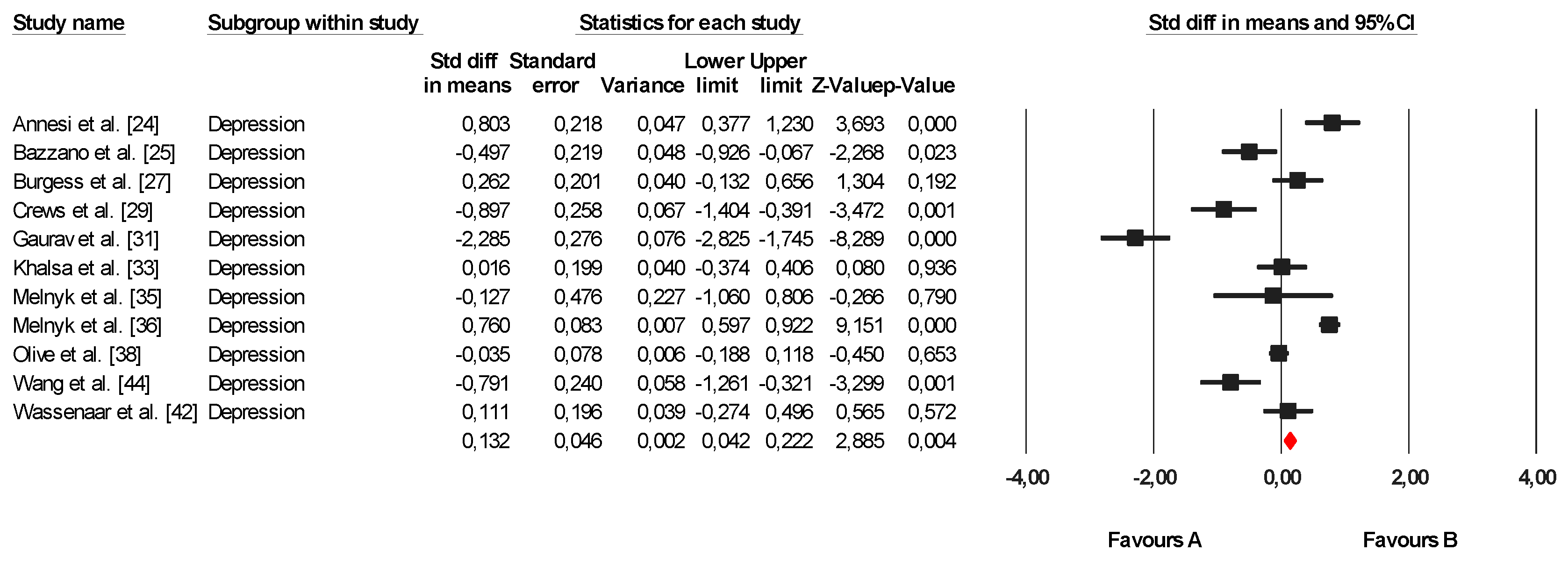
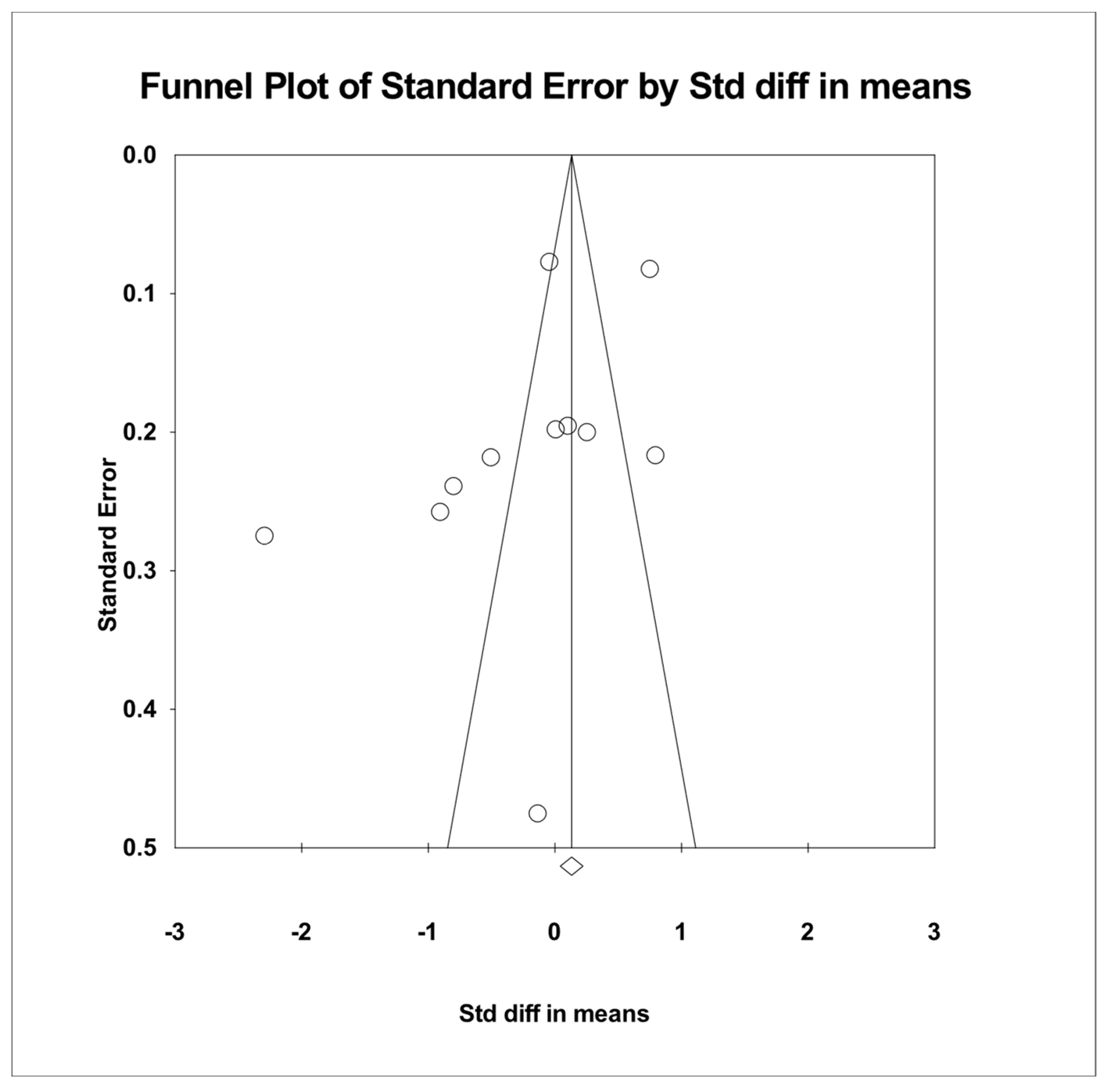



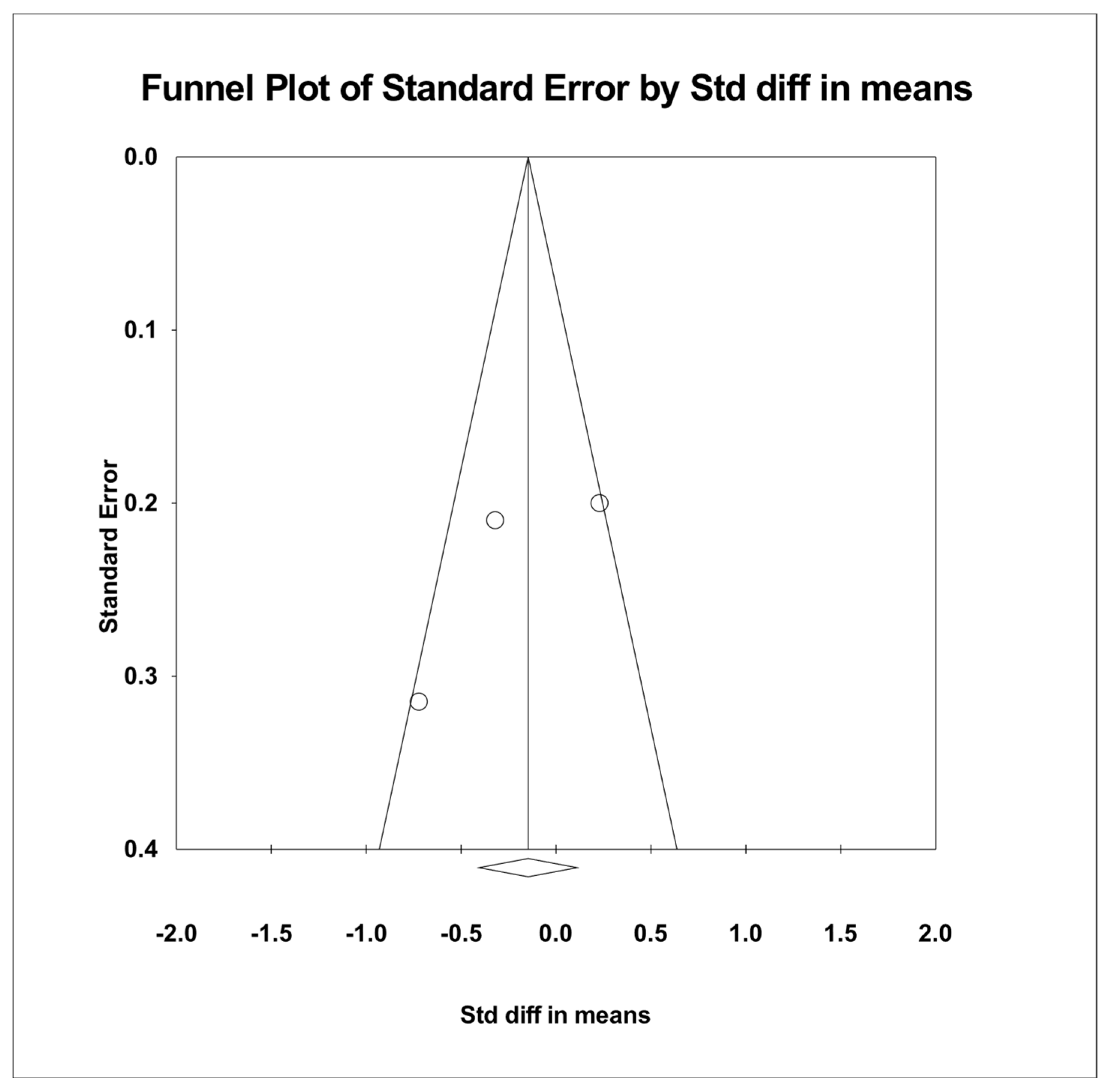
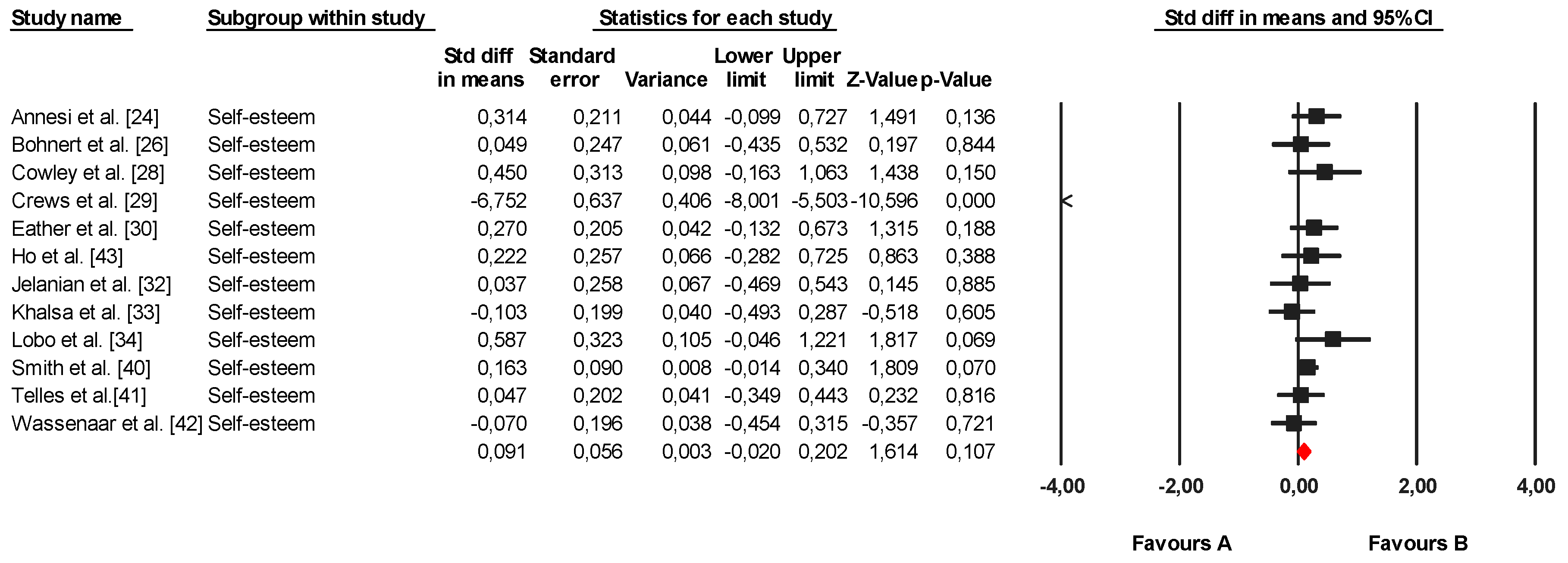
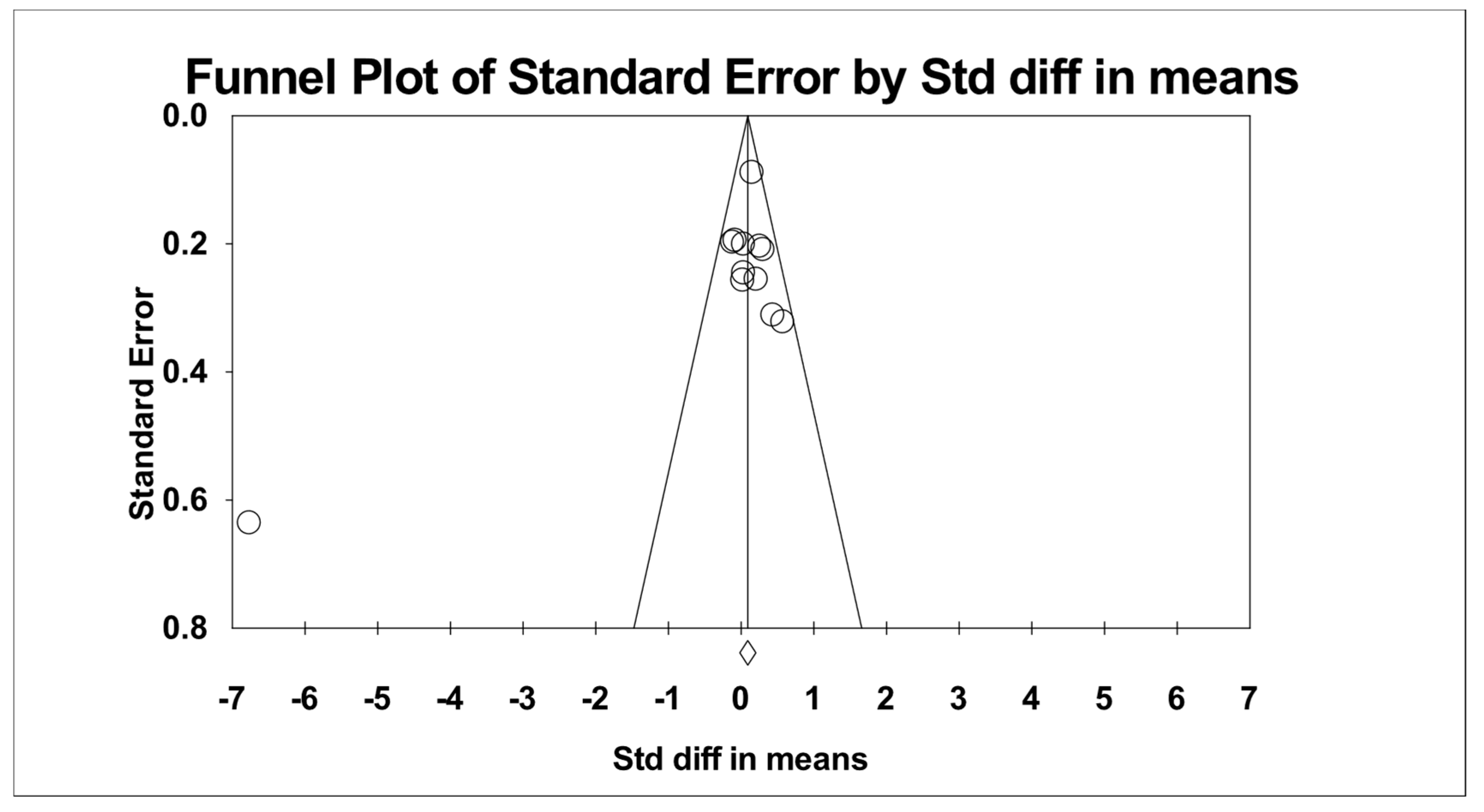

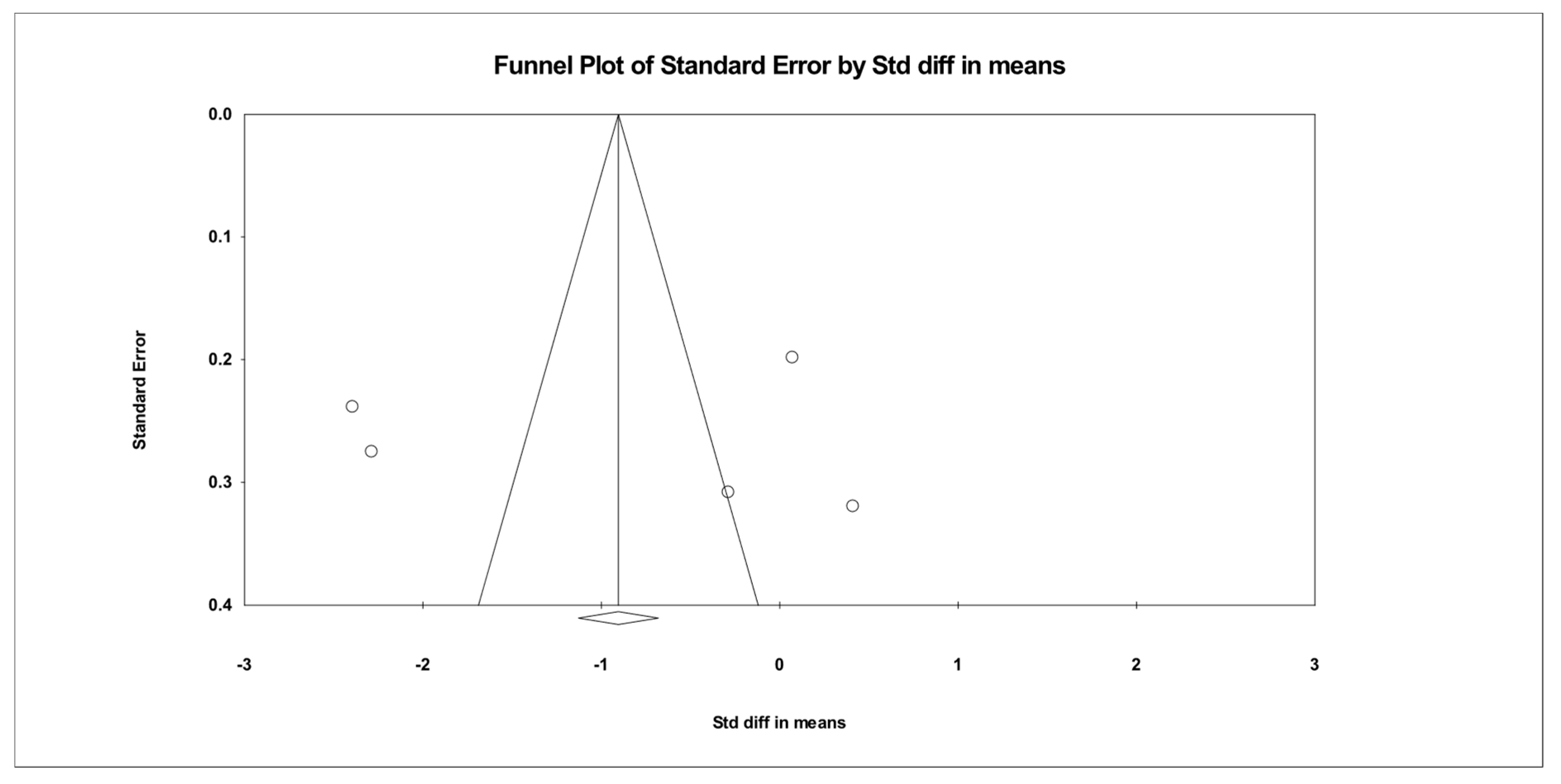
| Study | 1 | 2 | 3 | 4 | 5 | 6 | 7 | 8 | 9 | 10 | 11 | Total Score |
|---|---|---|---|---|---|---|---|---|---|---|---|---|
| Annesi et al. [26] | 1 | 0 | 0 | 0 | 0 | 0 | 0 | 0 | 0 | 1 | 1 | 2/10 |
| Bazzano et al. [27] | 1 | 1 | 1 | 0 | 1 | 0 | 0 | 0 | 0 | 1 | 1 | 5/10 |
| Bohnert et al. [28] | 1 | 1 | 1 | 0 | 0 | 1 | 0 | 0 | 1 | 1 | 1 | 6/10 |
| Burgess et al. [29] | 1 | 0 | 0 | 0 | 1 | 0 | 0 | 0 | 0 | 1 | 1 | 3/10 |
| Cowley et al. [30] | 1 | 1 | 1 | 0 | 1 | 0 | 0 | 0 | 0 | 1 | 1 | 5/10 |
| Crews et al. [31] | 1 | 0 | 1 | 0 | 0 | 0 | 0 | 0 | 0 | 1 | 1 | 3/10 |
| Eather et al. [32] | 1 | 1 | 1 | 0 | 1 | 0 | 0 | 1 | 1 | 0 | 1 | 7/10 |
| Gaurav et al. [33] | 1 | 1 | 0 | 0 | 0 | 1 | 0 | 0 | 0 | 1 | 1 | 4/10 |
| Jelanian et al. [34] | 1 | 1 | 0 | 0 | 0 | 0 | 0 | 0 | 1 | 1 | 1 | 4/10 |
| Khalsa et al. [35] | 1 | 1 | 1 | 0 | 1 | 0 | 0 | 1 | 1 | 1 | 1 | 7/10 |
| Lobo et al. [36] | 1 | 1 | 1 | 0 | 0 | 1 | 1 | 1 | 0 | 1 | 1 | 7/10 |
| Melnyk et al. [37] | 1 | 1 | 1 | 0 | 1 | 0 | 0 | 0 | 0 | 1 | 1 | 5/10 |
| Melnyk et al. [38] | 1 | 1 | 1 | 0 | 0 | 1 | 0 | 0 | 0 | 1 | 1 | 5/10 |
| Noggle et al. [39] | 1 | 1 | 1 | 0 | 1 | 0 | 0 | 0 | 0 | 1 | 1 | 5/10 |
| Olive et al. [40] | 1 | 0 | 1 | 0 | 1 | 0 | 1 | 0 | 1 | 1 | 1 | 6/10 |
| Sharma et al. [41] | 1 | 0 | 1 | 0 | 0 | 0 | 0 | 0 | 0 | 1 | 1 | 3/10 |
| Smith et al. [42] | 1 | 1 | 1 | 0 | 1 | 0 | 0 | 0 | 0 | 1 | 1 | 5/10 |
| Telles et al. [43] | 1 | 1 | 1 | 0 | 1 | 0 | 0 | 1 | 1 | 1 | 1 | 7/10 |
| Wassenaar et al. [44] | 1 | 0 | 1 | 0 | 1 | 1 | 0 | 0 | 0 | 1 | 1 | 5/10 |
| Ho et al. [45] | 1 | 1 | 1 | 1 | 1 | 0 | 0 | 0 | 1 | 1 | 1 | 7/10 |
| Wang et al. [46] | 1 | 1 | 1 | 0 | 1 | 0 | 0 | 0 | 1 | 1 | 1 | 6/10 |
Disclaimer/Publisher’s Note: The statements, opinions and data contained in all publications are solely those of the individual author(s) and contributor(s) and not of MDPI and/or the editor(s). MDPI and/or the editor(s) disclaim responsibility for any injury to people or property resulting from any ideas, methods, instructions or products referred to in the content. |
© 2025 by the authors. Licensee MDPI, Basel, Switzerland. This article is an open access article distributed under the terms and conditions of the Creative Commons Attribution (CC BY) license (https://creativecommons.org/licenses/by/4.0/).
Share and Cite
Carcelén-Fraile, M.d.C.; Aibar-Almazán, A.; Hita-Contreras, F. Aerobic Training on Mental Health in Children and Adolescents: A Systematic Review with Meta-Analysis. Appl. Sci. 2025, 15, 9572. https://doi.org/10.3390/app15179572
Carcelén-Fraile MdC, Aibar-Almazán A, Hita-Contreras F. Aerobic Training on Mental Health in Children and Adolescents: A Systematic Review with Meta-Analysis. Applied Sciences. 2025; 15(17):9572. https://doi.org/10.3390/app15179572
Chicago/Turabian StyleCarcelén-Fraile, María del Carmen, Agustín Aibar-Almazán, and Fidel Hita-Contreras. 2025. "Aerobic Training on Mental Health in Children and Adolescents: A Systematic Review with Meta-Analysis" Applied Sciences 15, no. 17: 9572. https://doi.org/10.3390/app15179572
APA StyleCarcelén-Fraile, M. d. C., Aibar-Almazán, A., & Hita-Contreras, F. (2025). Aerobic Training on Mental Health in Children and Adolescents: A Systematic Review with Meta-Analysis. Applied Sciences, 15(17), 9572. https://doi.org/10.3390/app15179572









